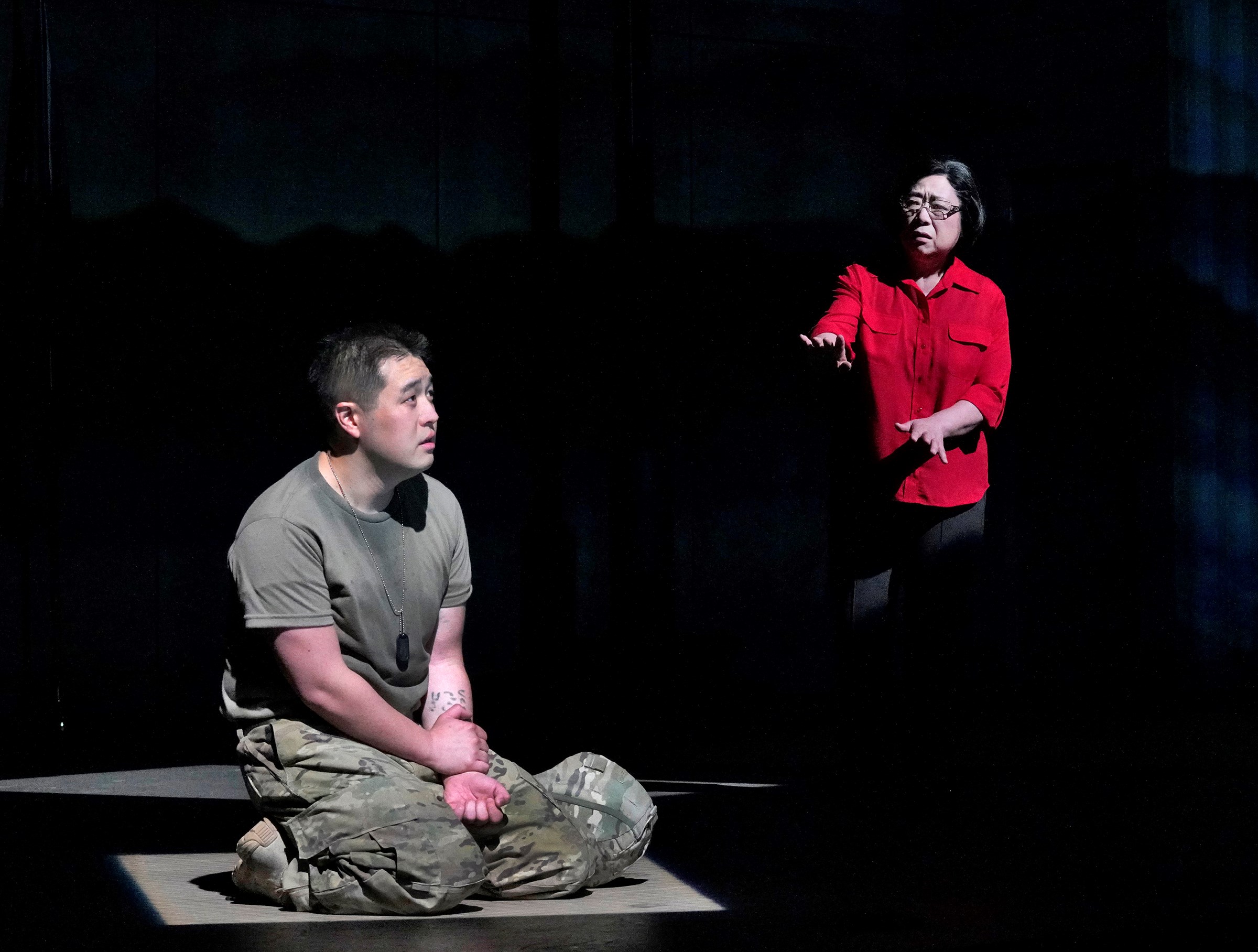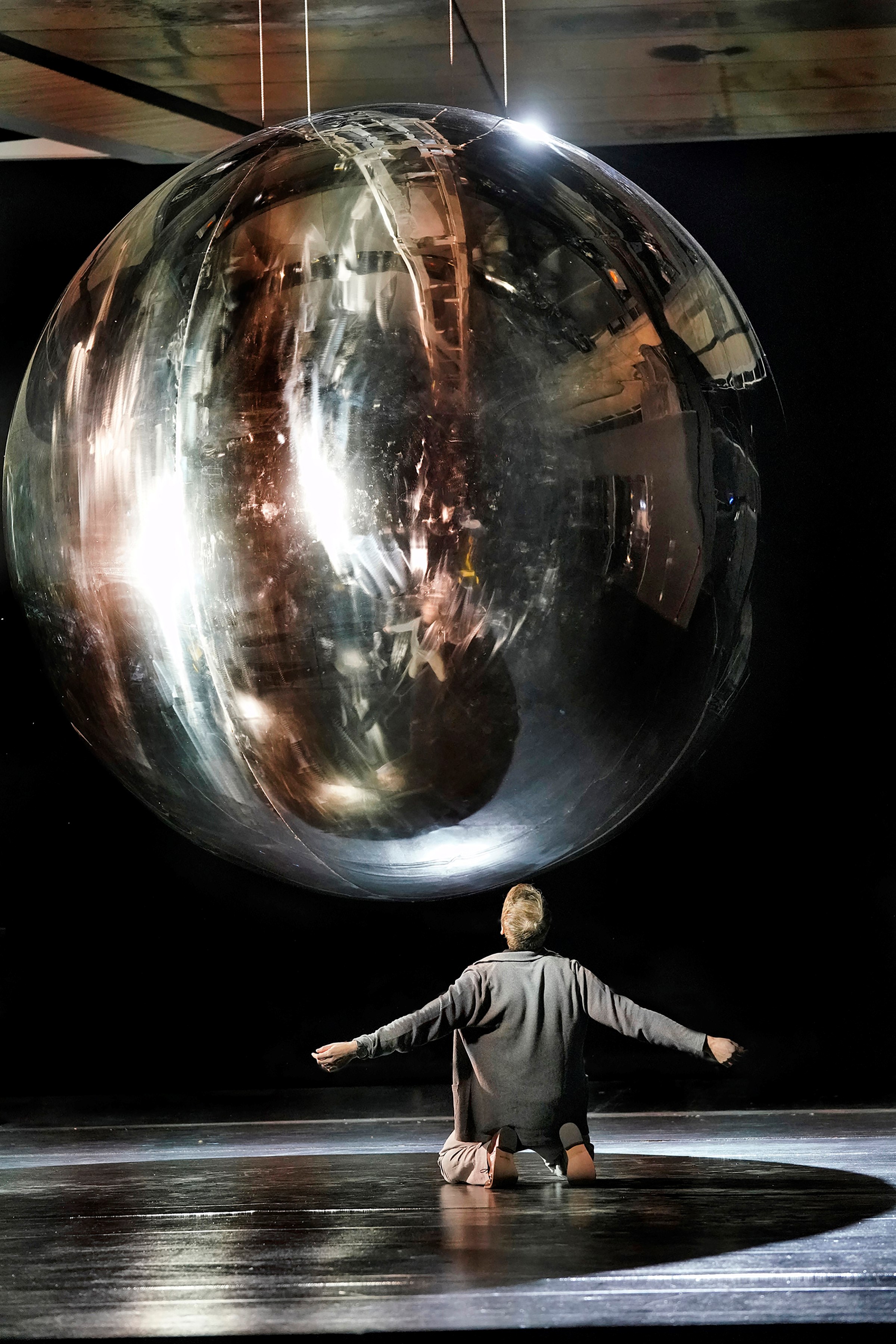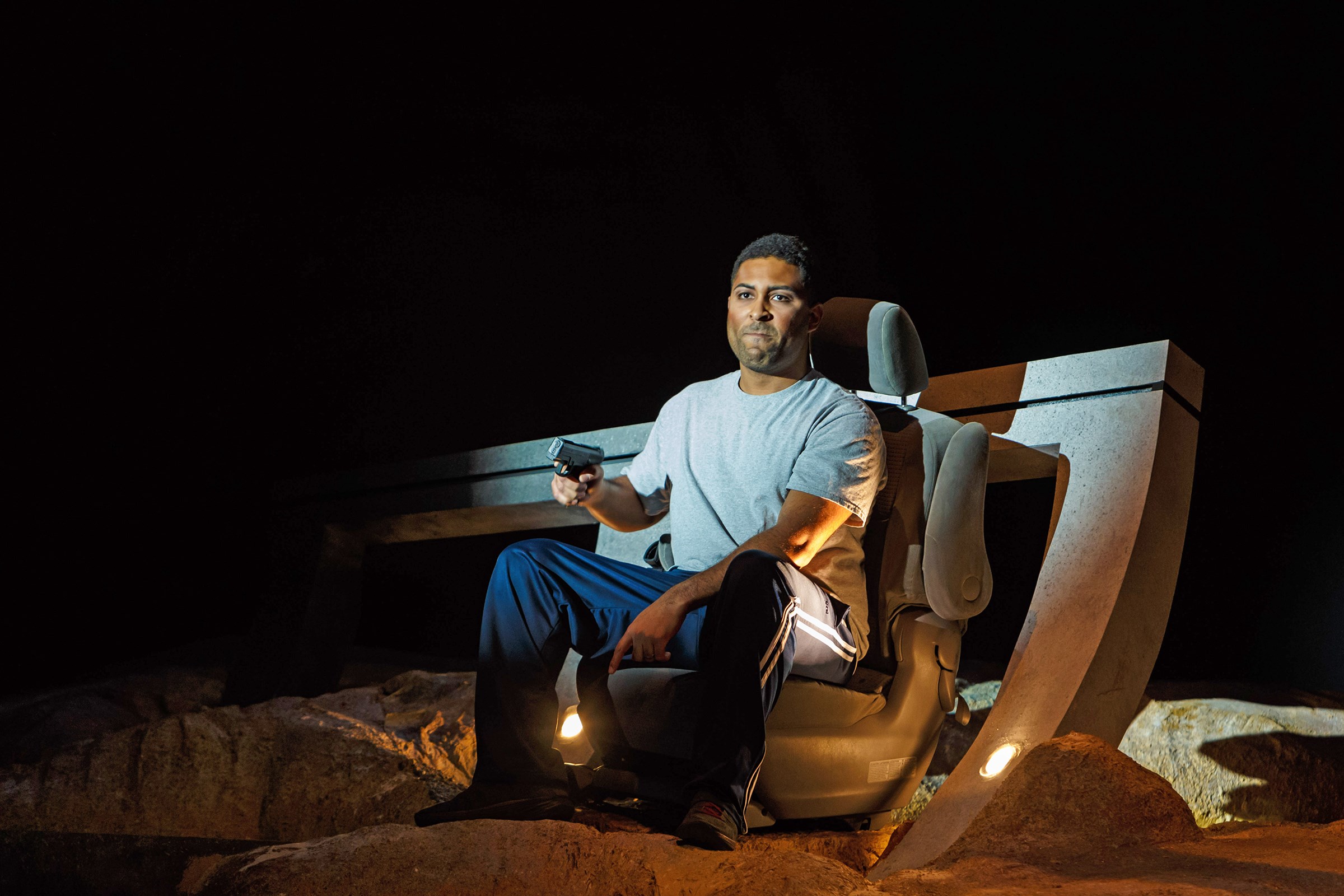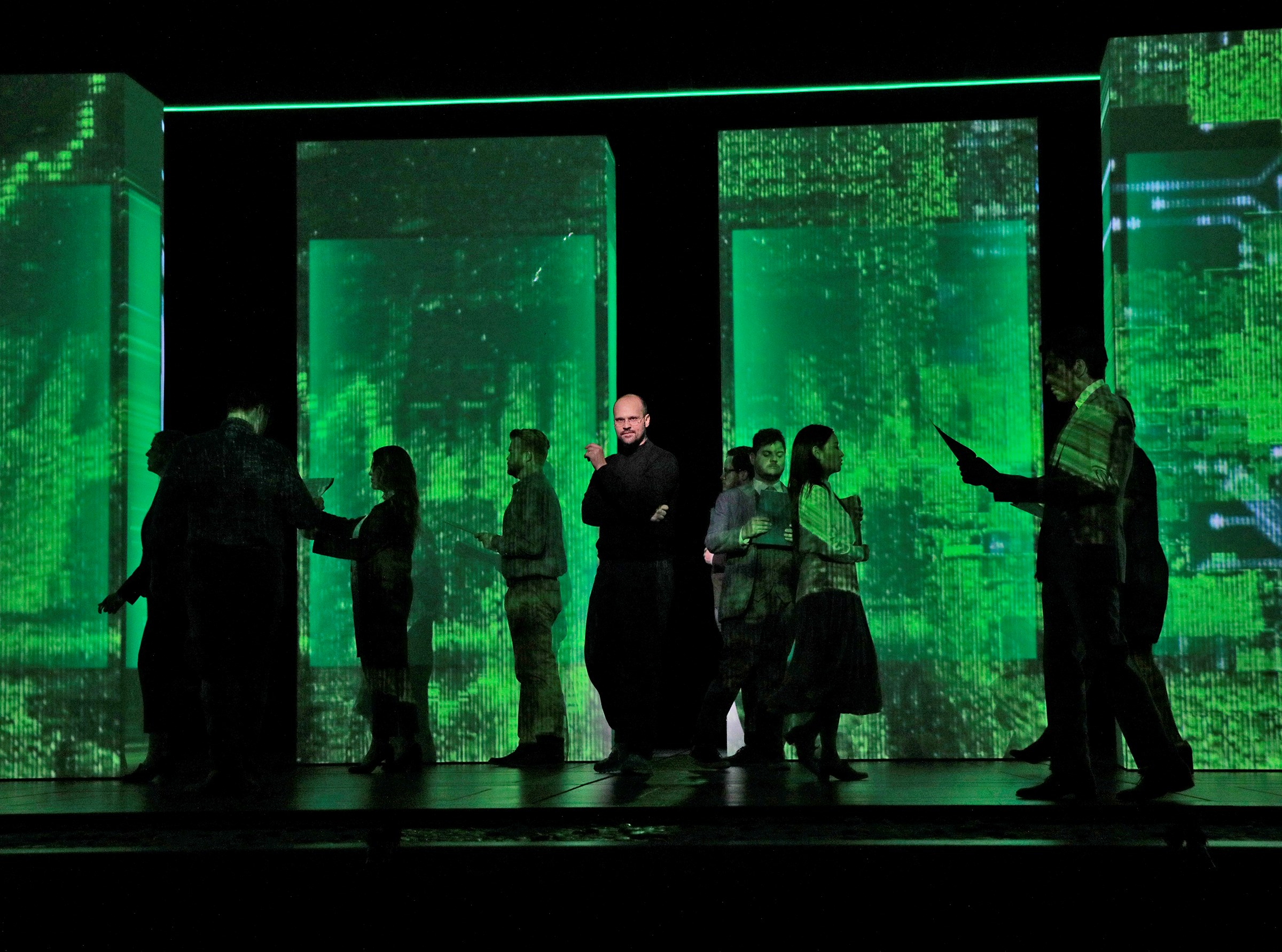Ripped from the Headlines
New works about recent events and real people pay off for opera companies

In 2011, the shocking story of Danny Chen’s suicide hit newspapers and cable networks. A Chinese-American private in Afghanistan, Chen shot himself after racial hazing from his fellow soldiers. This June, Opera Theatre of Saint Louis brought Chen’s tale to the stage, in the form of the full-length premiere of Huang Ruo and David Henry Hwang’s An American Soldier. The work follows an accelerating trend of recent years. Anna Nicole, Thumbprint, Champion, JFK, Everest, the new version of Appomattox, The Long Walk and The (R)evolution of Steve Jobs are based on real people and events; recent and upcoming operas such as Fallujah (about the Iraq war), Blue (about a black police officer and the killings of young black men by police) and Castor and Patience (about an African-American family caught in the financial crisis of 2008) use fictional characters but explicitly mine painful contemporary themes for their subject matter.
“We used to think that we didn’t want to dirty our beautiful opera history with anything popular or current,” says director James Robinson, artistic director at OTSL, who has nurtured numerous new works over the years. Today, with opera companies working to increase their public service, contemporary stories represent a rich reservoir of possibility. “Every company is in the same boat, trying to figure out how to engage audiences in stories that interest them,” Robinson goes on. “The old formula — ‘bring them to La bohème and they’ll be hooked for life’ — doesn’t work anymore. But when they see something based on Steve Jobs or Danny Chen, it’s a different experience; they say, ‘Opera is not what I thought it was.’ We are catching up with the times.”
Although television, theater and film have always mined contemporary stories, the more conservative opera world has traditionally hewed to perceived audience preferences for the familiar. The contemporary world might have shown up in updated productions of repertory classics, but new operas were more often based on famous literary properties like The Great Gatsby or Little Women. But even titles like those may no longer command recognition at the box office. “When we did The Grapes of Wrath at OTSL, people didn’t know the novel,” Robinson says.
A new opera based on contemporary events has enormous potential to reach beyond the core opera audience, and even to change the community’s perception of the company. Opera companies tend to shy away from risk and controversy, but some have found that a controversial story, when used to open dialogue, can be an asset. When OTSL produced the Death of Klinghoffer in 2011, it brought together Jewish and Muslim leaders and communities in St. Louis for in-depth discussions far in advance, forestalling the kind of rancorous response that greeted the opera’s premiere two decades earlier. The company has built on that groundwork in subsequent years, creating relationships with all kinds of local organizations; for example, African-American and LGBT groups for Champion, Muslim and Hindu ones for Shalimar the Clown, and Chinese-American and veterans organizations for An American Soldier. “We are Opera Theatre of Saint Louis, and we take the ‘of Saint Louis’ part as seriously as the ‘opera’ part,” says Timothy O’Leary, who recently concluded a decade-long tenure as the company’s general director.

For O’Leary, community connection is about much more than selling tickets; he believes that opera companies have an important role to play in larger discourse. “Subjects that in other contexts are political and divisive can be unifying in an artistic one,” he says. “The artistic work that gives people the opportunity to come together in the same physical space, and be moved by the same story, despite their differences — these kinds of opportunities are increasingly rare in contemporary life, and therefore increasingly valuable. Remember, the Greeks invented theater and democracy at the same time.”
The trend has its roots in the latter years of the last century, with works like Malcolm X (1986), Nixon in China (1987), Klinghoffer (1991) and Harvey Milk (1995) –– often dismissively lumped together as “CNN operas.” The start of the current spate was Jake Heggie’s Dead Man Walking, which has had dozens of stagings since its 2000 premiere at San Francisco Opera. Director Francesca Zambello, who heads The Glimmerglass Festival and serves as artistic director of Washington National Opera and has long been an enthusiastic proponent of contemporary-themed operas, notes how cleverly the piece humanizes the hot-button issue of capital punishment: “You come to care about a murderer through Sister Helen Prejean.”
Sister Helen herself became an indefatigable asset to the opera, making personal appearances in cities where it was being performed. Some companies have gone even farther with the opera’s potential for community involvement: When Pensacola Opera presented its Florida premiere in 2017, it surrounded the production with 12 “town hall meetings.” These events were held over the course of several months, in partnership with numerous community organizations, hosting clergy, prisoner assistance groups, law enforcement personnel, legal aid attorneys and others for panels and presentations. Jerome Shannon, the company’s executive director and music director, even persuaded a local woman who had been the victim of a particularly heinous crime to talk about why she supports the death penalty.
Andreas Mitisek, the artistic and general director of Long Beach Opera, says that the company’s 2016 production of Fallujah, and the events surrounding it, created an important connection between LBO’s core audience and the veterans and marines who came because of the subject matter. An LBO-produced 10-minute documentary about PTSD was screened before the performances, and veterans stayed afterward to take questions from the audience. “The vets and their families said it was part of the healing process — they were afraid to talk about PTSD, but the opera helped them,” Mitisek says.
When Pittsburgh Opera presented The Long Walk in 2018, it staged several events pairing Brian Castner, whose book about his experiences as a bomb disposal expert in Iraq was the basis of the opera, with Ben Taylor, the singer who portrayed him. They appeared on KDKA-TV’s morning talk show Pitts- burgh Today Live. “That’s something that would never happen for Madame Butterfly,” says the company’s marketing and communications director, Chris Cox. All told, The Long Walk created “a greater awareness that we exist,” Cox says. “Putting this into the conversation shows that we are not a dated thing from hundreds of years ago.”

Current-event opera can have an enormous impact at the box office. At its Santa Fe Opera premiere run in 2017, The (R)evolution of Steve Jobs sold 99 percent of its ticket inventory, including a seventh performance that was added to accommodate demand; the advance press across all media was enormous, and 120 critics attended the opera (Santa Fe usually hosts between 30 and 40 during the season).
General directors report occasional pushback from some of their regular constituents over these operas. Pensacola lost a board member over Dead Man Walking; some subscribers at OTSL skipped An American Soldier. However, such responses tend to be the exception rather than the rule, and some of the operas hit the sweet spot with both regulars and new attendees: At OTSL, Champion sold at 98 percent capacity. Furthermore, certain funders — foundations, board members and other donors — are particularly committed to paying for this kind of work. O’Leary says, “The older style of philanthropy — art for art’s sake — has not disappeared, but I think the current generation of donors requires that we are not in an ivory tower if they are going to support us at all.”
Still, companies remain concerned about risk, and those with smaller, alternative spaces to work with can limit their exposure by presenting chamber-sized pieces, such as The Long Walk or Glory Denied. “It’s great that we can use a smaller venue to speak to different audiences, and not feel the pressure of getting money for a big new work,” says Zambello. “However, I think it’s our responsibility as general directors to do these kinds of pieces in the grand opera context, as well.”
Making an opera out of a current event or contemporary subject can present special challenges for the creators. When Mason Bates told Charles MacKay, then general director of The Santa Fe Opera, that he wanted to write his first opera about Steve Jobs, MacKay was initially wary. “I was concerned about rights, and that we might get bogged down in obtaining permissions, thinking about how powerful Apple is,” Mackay recalls. The company did considerable due diligence on the legal front, ensuring that all of the material that the creators were using was in the public domain. They were not permitted to use any Apple insignia or logo, and the program carried a disclaimer stating that the opera, while inspired by the life and creative spirit of Jobs, was fiction. The libretto and a letter from Bates were sent to Laurene Powell Jobs through an intermediary; she did not respond.

The fictionalization of real lives can be a key part of building a convincing musical and dramatic arc. Royce Vavrek’s first draft of the libretto for JFK, his opera with David T. Little, was a historical narrative, but both creators quickly realized that wasn’t their style at all; the final piece was more of a dreamscape. Vavrek says, “Like a literary source, a life provides a foundation from which to jump off. With JFK, we realized that if we were really going to author this story, we had to abstract it. The opera version had to exist on its own as a piece of drama, and deviate from historical fact as much as the storytelling required.”
Presenting real characters and situations, warts and all, can be a stumbling block when the subjects or their relatives are still alive. “I strive to get to the truth of the characters,” Vavrek says. “I don’t think they are served if you just make them look good.” For An American Soldier, librettist David Henry Hwang and composer Huang Ruo met with Danny Chen’s family to be sure that they were comfortable with the idea of the opera; however, even though the family has never accepted the fact that Chen killed himself, the opera makes it clear that he does.
The events themselves can’t be the sole selling point for these pieces, says Zambello: They have to work as operas. “You have to use the magic of opera, to put another layer on it,” she says. “It can’t be ‘docudrama’; it has to be about a bigger theme.” In his keynote address at Opera Conference 2018, John Adams, responding to what he sees as a profound misunderstanding of his operas as “docudrama” — and Nixon in particular as satire — described his pieces in Wagnerian terms as artistic explorations of the “sometimes bizarre, sometimes heroic” mythology of American life.
Producing operas about up-to-the-minute topics requires an extra measure of care. In addition to bringing the Chen family to St. Louis for the premiere of An American Soldier, OTSL took special pains to be sure that all representations of the U.S. Army, such as uniforms, were correct. “People remember, and they will react unfavorably to the artistic content if the historical content is lazily approximated,” says O’Leary.
Three of the current-event operas scheduled for world premieres in the 2018–2019 season are likely to test how challenging contemporary subjects fare in today’s opera marketplace. At Glimmerglass, Jeanine Tesori and Tazewell Thompson’s Blue explores the incendiary nexus of African-Americans and the police. At OTSL, Terence Blanchard and Kasi Lemmon’s Fire Shut Up in My Bones, based on the memoir by New York Times columnist Charles Blow, is the story of a young man’s escape from a toxic background; in the book, the portrayal of the black southern community where he grew up is harrowing and unflattering. And in a tale truly ripped from the headlines, Long Beach Opera, which specializes in the unconventional, will stage Anthony Davis’ Central Park Five, based on the notorious 1989 case in which five teenagers of color were convicted of attacking a white female jogger, went to prison, and were subsequently exonerated. A key character in the opera is Donald Trump, who loudly insisted on their guilt, and continued to do so even after their convictions were overturned. “In the opera, he represents the blindness of what this case did,” says Mitisek. “Justice is blind, but sometimes in the wrong way. The case still comes up in columns and opinion pieces — it is as relevant now as it was back then. We’re telling an outrageous story that must be told.”
Mitisek isn’t worried about controversy. Although his audience is adventurous, he says, “We get pushback, and we should. We want people to voice their opinions.” He cites The Death of Klinghoffer, which Long Beach staged in 2014: “It was written so many years ago, and the controversy it still creates speaks to the power of art. When people think it is worth protesting against a work of art, taking it so seriously, it becomes a catalyst for conversation.
This article was published in the Fall 2018 issue of Opera America Magazine.

Heidi Waleson
Heidi Waleson is The Wall Street Journal’s opera critic and the author of Mad Scenes and Exit Arias: The Death of New York City Opera and the Future of Opera in America.






